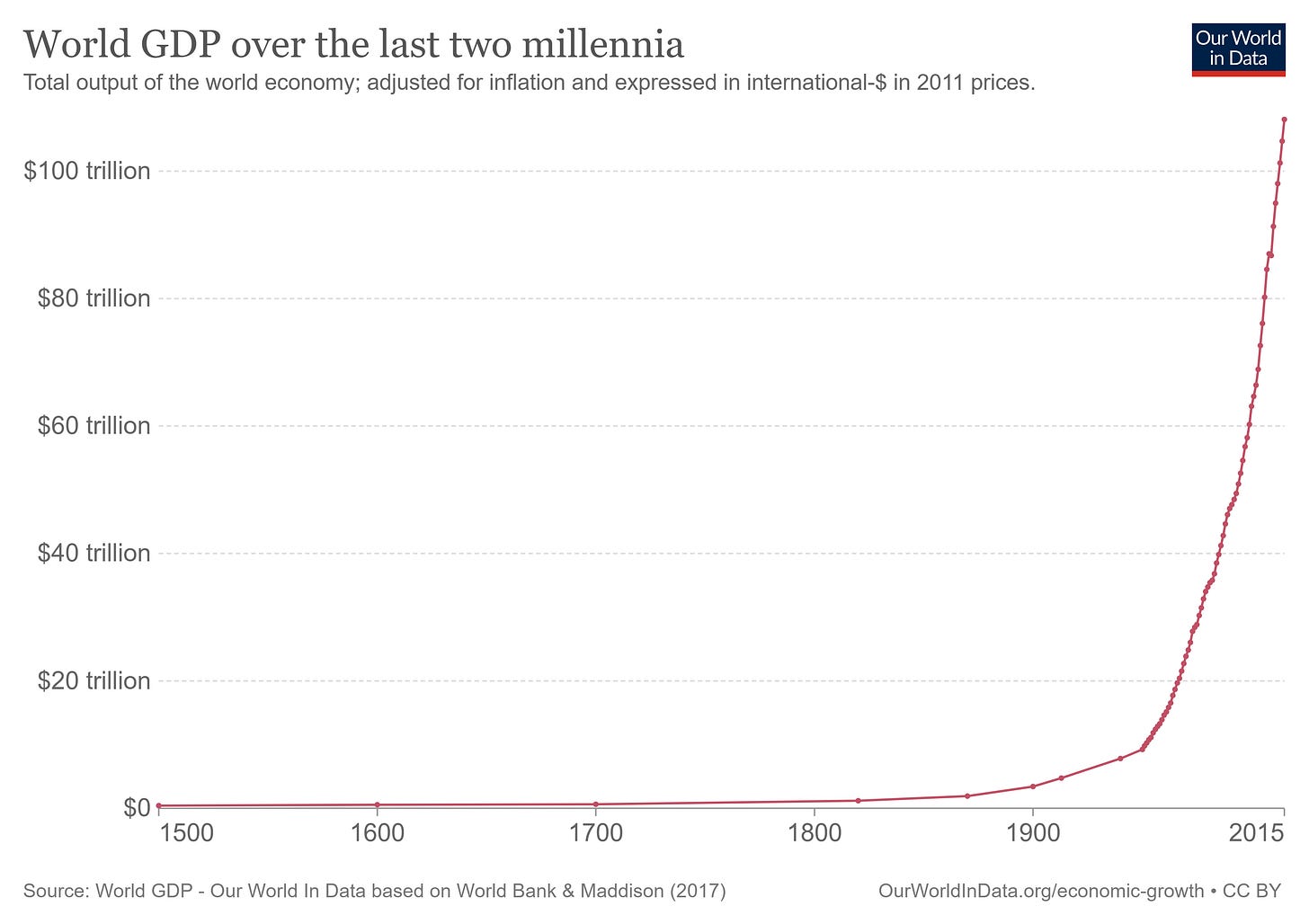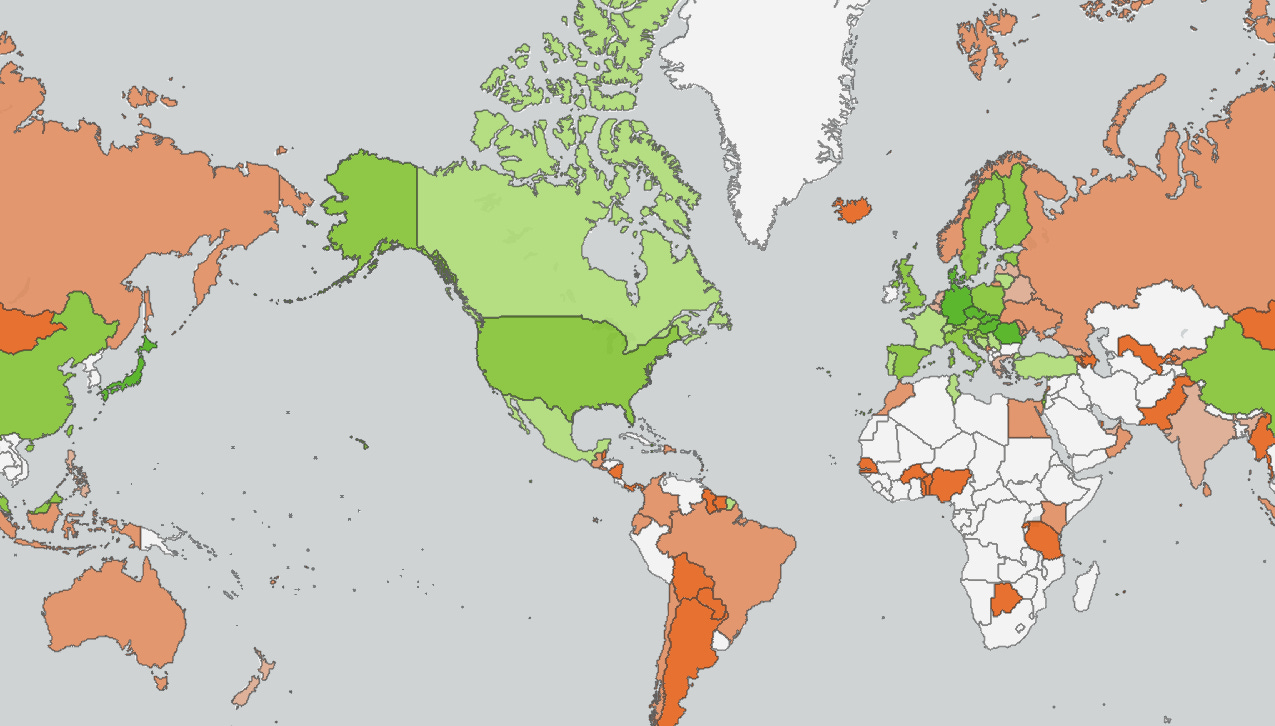Photo by Andrew Te on Unsplash
We’ve had a hard year. Okay, let’s be honest, we’ve had a hard few years. There’s plenty to worry about. And we’ll continue worrying and criticizing in the weeks and months to come.
But for Christmas weekend, I’d like to take a moment to remind everyone of some economic reasons to pause, take a breath and be appreciative of where we actually are at this point of time in the world.
We Live in the Most Prosperous World Ever
For most of human history, most people lived in poverty and hunger over a life span of less than 40 years. Many children died early and many women died in childbirth. That all changed about 200-300 years ago.
Scholars debate the exact dates, but the late, great Nobel Prize Winner, Professor Douglas North, argued quite convincingly that legal changes in property right laws in England in the 1600’s spawned what turned into the Industrial Revolution in the 1700’s[1]. Since that period, the spreading of the rule of law and of market-based economic orders has led to the most widespread and highest level (and growth) of prosperity we’ve ever known. It has led to the most people, the wealthiest people and the most free people in all of human history. That process continues in real time today.
Here is a truly shocking graph from the World Bank[2]. It’s why many economists obsess over economic growth.
The graph is “World GDP over the last two millennia”. The full graph starts at 0 , a fitting starting date for an email at Christmas, but I truncated it here to start at 1500 to help us see some of the details better.
The turning point starts in the mid-1700’s although it’s hard to see due to later growth dwarfing those earlier gains. It becomes more pronounced in the mid-1800’s, then rises exponentially starting around the mid-1900’s, with the end of the world wars. After the world wars, the rule of law (the first true pre-requisite for sustained economic growth) began spreading around the world to other countries and that spawned markets and long-term, sustained growth. The result is higher income, more wealth, and an abundance of luxuries from foods to cars to smartphones.
The Effects Over Time of Higher Incomes (GDP)
As people’s incomes rise, lifting them out of poverty, they first improve their own health and diet. In market economies, that drives demand for more and better food and more and better healthcare, among other things. It then drives demand for a cleaner world.
Rising Incomes Lead to Better Health
That higher-income effect gets reflected very quickly in improved health and health care as we can see in the World Bank’s graphs of “Life expectancy, 1543 to 2021” and Life Expectancy vs GDP per capita”, back to back below. Take a moment and look hard at that first graph. It’s amazing.
The first graph shows that life expectancy has historically been less than 40 years and improved dramatically over the last 100 years. The second graph ties those improvements in life expectancy to GDP per capita.
As the World Bank notes,
“For the UK – the country for which we have the longest time-series – we see that before the 19th century there was no trend for life expectancy: life expectancy fluctuated between 30 and 40 years.
Over the last 200 years people in all countries in the world achieved impressive progress in health that lead to increases in life expectancy. In the UK, life expectancy doubled and is now higher than 80 years. In Japan health started to improve later, but the country caught up quickly with the UK and surpassed it in the late 1960s. In South Korea health started to improve later still and the country achieved even faster progress than the UK and Japan; by now life expectancy in South Korea has surpassed life expectancy in the UK.”[3]
Along with life expectancy goes a general decline in child mortality. The World Bank data in this graph, “Child mortality rate”, only goes back to the 1960s. But the progress since then is still impressive and graphs for the US and Western Europe would have looked similar if we had good data back another 100 years or so.
I personally consider the drop in child mortality so extremely valuable on a human level that it’s hard to express. Yes, living longer is good and, yes, it’s important that more children live. But on a personal level, child mortality is something I just can’t imagine. As a father with two children, I can’t imagine a world where there is a, say, 50:50 chance that my child (or their mother) won’t live. I think of all the parents and siblings who faced that regular fear and loss for most of history and what a blessing it is that it’s a thing of the past for more and more of humanity every day.
Higher Incomes (GDP) Lead to a Cleaner World
Very quickly, rising incomes and wealth drive demand for cleaner air, cleaner water and, today, greener technologies in everything from our cars to our major energy sources. We can debate the details and the right or wrong policies, but on the whole, as people get wealthier, they want a cleaner world.
As incomes rise, everyone demands a cleaner space around them. We wear clean clothes, we clean ourselves, we prefer cleaner homes, we demand access to clean water and to clean air. We want to live in places with trees and fresh fruit stands. And, if we are honest, we all want a cleaner planet with less pollution. And, if we can, we’d like to leave our planet cleaner for the next generation than it was when we inherited it.
The International Monetary Fund (IMF) began a new project tracking green tech, green exports and the green effect of development, financing and the like. This IMF graph is their “Advanced Economies maintain Comparative Advantage in Exports of Low Carbon Technology Products” interactive graph (if you follow the link in footnote [4] below).
The IMF explains the graph as follows.
“This map shows that advanced economies maintained their comparative advantage in exporting Low Carbon Technology (LCT) products in 2021. Low-carbon technology products are products that feature technology adapted to a low-carbon economy, specifically technology that reduces greenhouse gas emissions. These include wind turbines, solar panels, and carbon capture equipment.” [4]
Is the world clean? No. Can we do better? Yes. But we are doing better today than ever before. It is starting in the advanced economies - where incomes rose first - and is spreading globally.
We can debate what policies are best, worst, moving too fast or slow. But in the end, a cleaner world is a luxury that the rich can afford first. And it is a wonderful thing that we are moving in that direction and helping spread the technologies that make it possible. I would also love to see a further spread of the legal-economic environment so that everyone becomes wealthier and can afford to demand such luxuries as well.
Putting all the policy debates aside, it is unambiguously good that we want a cleaner world and that we are moving in that direction.
In An Imperfect World We Can Still Stop and Count Our Blessings
The world is imperfect. It always has been and always will be. There is inequality. There is racism. There are environmental problems. There are political problems. There are economic problems.
But, as we end 2022, let’s take a minute to appreciate where we are and how lucky we all are to be here. We inherited an amazing world with abundant luxuries that we enjoy. We are healthier, we are trying to clean our planet, we are trying to improve the lot of the poor, and we enjoy technologies that no one could even have imagined for 99.9% of human history.
So take a minute, put aside your complaints and disagreements for a few days, and say a thankful prayer for the amazing things we do have. We will have enough time to complain and argue next year :-)
Thank you for reading my column this year. I plan to build and grow it next year and look forward to having you join me for the ride.
Sincerest best wishes,
Merry Christmas and Happy New Year,
Chris Ball
[1] North argued that the fundamental change can be traced to the 1624 change in British patent law in its Statute on Monopolies. But “[m]ore important than patent law per se is the development and enforcement of a body of impersonal law protecting and enforcing contracts in which property rights are specified”. Again, what we might call “rule of law” with well defined property rights. See Douglass C. North, Structure and Change in Economic History, W.W. Norton & Company, 1981, Chapter 12 “The Industrial Revolution Reconsidered”, specific quote from pp. 164-165.
[2] World Bank graphs can be found here: https://ourworldindata.org/life-expectancy#life-expectancy-has-improved-globally
[3] Same World Bank reference as previously: https://ourworldindata.org/life-expectancy#life-expectancy-has-improved-globally
[4] IMF data is here (scroll down on the main page to find this graph on Exporting Low Carbon Tech:
https://climatedata.imf.org/
.









Good to hear such positive statistics after a year of political grousing and backbiting.